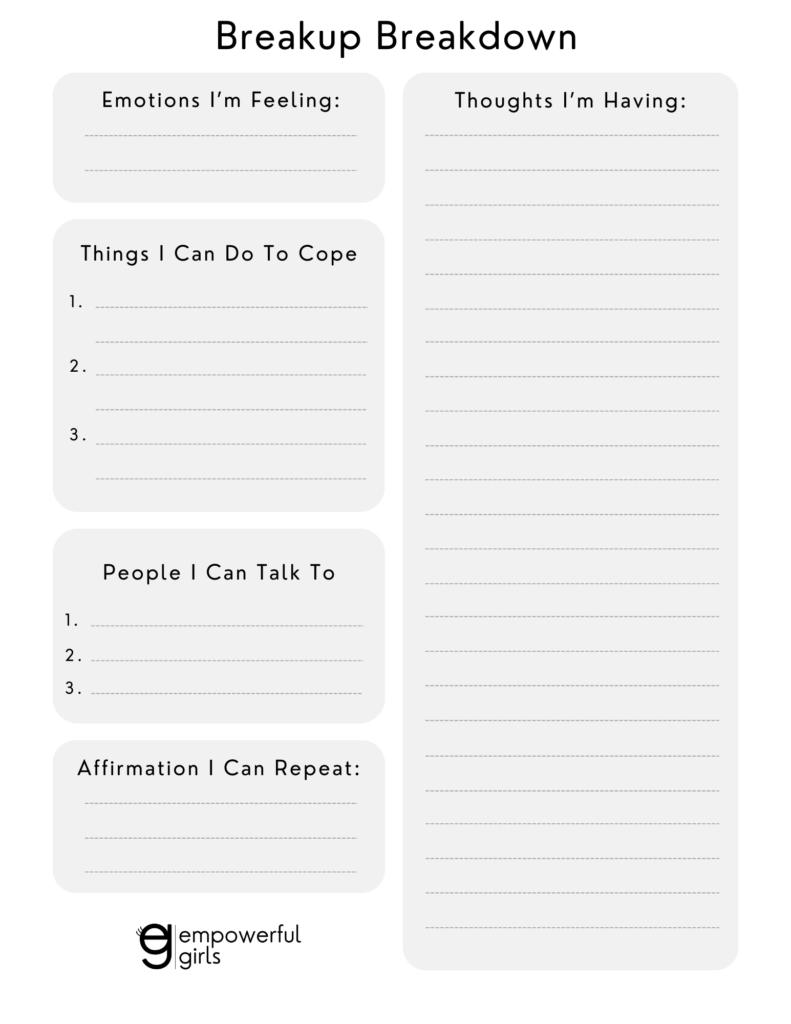
Friendship and Relationship Breakups
We’re taking on a requested topic: breakups. Whether it’s a friendship or someone you were going out with, when a relationship ends it can be tough.
Breakups happen for many reasons. A lot of times it’s because of toxic behavior (more in episode 51, Friendship red flags):
- Constant drama–there’s a recurring cycle of fight-breakup-makeup
- Lost trust–someone said or did something that betrayed the relationship beyond repair
- Hurtful treatment–emotional or physical, being unkind, critical, excluding, controlling
- Take only–one person is constantly giving to the relationship while the other is only taking, no reciprocation
Sometimes though it’s just disconnection or differences: whatever brought you together–interest, activity, a class, values, living nearby–that changes and things just aren’t working the same. You may see it coming as you slowly drift apart, and other times it’s completely unexpected. Over the years you’ll likely be both the person who initiates the breakup, and be the person who was broken up with. However it happens and whichever role you’re in, breakups can still be difficult.
I experienced multiple breakups as a tween and teen, and also as an adult. They were tough, and I got through it. I want to offer some guidance on how to handle a breakup before, during, and afterward. With each I’m going to discuss what I DO recommend and what I DO NOT recommend. I understand relationship dynamics differ, so take what you need.
Before the Breakup
Mindfully Consider It
If you are initiating the breakup, I do not recommend making this decision abruptly or casually, because you’ll likely not handle it as well or make a rash decision you regret if you don’t think it through. I recommend that before you choose to breakup–mindfully consider the situation. Are there relationship wounds you can heal together or are things too broken to fix. You may have mixed feelings about ending the relationship OR consider giving things another chance. Breaking up can feel like a hard thing to do AND the right thing to do. Remember that it’s ok to feel multiple emotions at the same time. It may help to write out your feelings in a journal to get more clarity on what you choose to do. While you may also seek advice from trusted friends or adults, it’s your decision about your relationship.
On the other hand, if you sense that the other person is going to break up with you, you might feel like beating them to it so you’re not the one getting dumped. Whatever you decide to do, again, I do not recommend making this decision abruptly or casually. Rewind a bit if you need a reminder why not, and what I do recommend.
During the Breakup
Break Up In-Person
If you are initiating the breakup, this may be an unpopular opinion, but I do not recommend ending the relationship with a text, DM or email. I’m sure lots of people do, and if you’ve been on the receiving end of a breakup text, you know how much it stinks. Pulse there’s more room for misunderstanding since you can’t sense tone by reading text. I also do not recommend breaking up with someone in front of a bunch of people, because that could be humiliating–for you both. Show respect to the other person and yourself. I recommend asking them to talk with you somewhere in public where you can speak openly yet also have a private conversation, like on their front porch or at a community park. A neutral location can help you both not feel as defensive. If in-person is not an option, next would be video chat, then phone call–again, not in front of a bunch of people. If you feel having someone else present is necessary, either for your support or your safety, be sure to inform them about the situation and your concerns about the person’s potential reaction.
Show Respect + Be Direct
When you start talking to them about breaking up, I do not recommend attacking or blaming them for what happened, or pointing out what’s wrong with them. You’ve probably seen shows depicting friend/relationship breakups where a character is mouthing off at the other person and feels victorious afterward. You might think doing this will help you feel better, but I do not recommend it. There are other approaches that can communicate the same message in a non-reactive way. I recommend you show respect and be direct.
Compliment Sandwich
Some people use a “compliment sandwich” to serve bad news. The bottom piece of bread is something kind, the meat in the middle is the bad news, and the top piece of bread is something else kind. If you feel a compliment sandwich is appropriate, you can begin by expressing gratitude or sincerely highlighting qualities about the other person, like “I really appreciate you helping me feel welcome when I joined our class,” or “I have a lot of fun memories laughing with you.” That’s the bottom piece of bread.
If there’s no bad blood between you, just disconnection or differences, you can share what you’ve observed, “I’ve noticed we don’t talk or text as much,” or “I feel like our chemistry has shifted.” That’s one kind of meat for the middle.
If there is some bad blood or toxic elements, you can assert your feelings and hold your boundaries using I-statements, like “I feel hurt when I’m constantly criticized,” or “It’s not ok with me when people keep betraying my trust.” That’s another meat option, and in some situations, just saying this without the bread may feel most appropriate.
Whichever meat you choose, from there you need to clearly say what you feel should happen, like “I think we should explore other friendships,” or “I don’t feel this is working for us anymore.”
If you want to add a top piece of bread, share another kind thought, like “I sincerely wish you the best,” or “Take care, I hope you find an even greater connection.”
Their Response
The person may respond by pleading or arguing with you to stay together, but you’ve got to do what’s best for you and hold to your decision. Even if they get upset, try to remain calm and understanding. If the person asks why or asks other questions, you can decide how to answer them, and if there’s something you need to apologize for, be accountable. Just remember–show respect and be direct.
Getting Broken Up With
NOW if you are the one getting broken up with, I understand it can feel absolutely awful, I’m not gonna sugar coat it. Your first instinct may be to beg them not to leave you OR even lash out at them for ending the relationship. I do not recommend those reactions. When we allow our emotions to get out of control, it’s much more difficult to think clearly and process what’s going on. So here’s what I recommend. Allow yourself to feel your emotions without getting carried away by them. Imagine you’re walking down a hall with a suitcase filled with all of your emotions. We don’t want the emotions suitcase to lead and drag us all over the place, or start rolling ahead out of control, especially if we’re going downhill. We need to stay in control of the emotions suitcase. Make sense? During the breakup conversation, try to remain calm and mindful of your emotions. You can also show respect and be direct, expressing your feelings, apologizing if needed, and asking questions.
After the Breakup
Unhealthy Coping Strategies
Whether you initiated the breakup or got broken up with, you may feel multiple emotions at the same time–upset, dejected, isolated, betrayed, confused, bitter, insecure, jealous or resentful. You may want to plot your revenge, stalk them on social media or numb out with it, rebound with another relationship, get their attention so they want you back, turn to harmful substances or behaviors, or withdraw from the world. I do not recommend these coping strategies. There are many much healthier and effective options.
Let Yourself Feel
First I recommend you make space for your feelings. You may want to examine a feelings wheel to help you identify all of the many emotions you have. Let yourself feel them through free writing, music, or art.
Talk to Someone
Talking to someone can also help. A trusted adult, school counselor or therapist may offer helpful insight and perspective. Consider opening up to your parents, too.
Support Network
Spend time with friends and family. Surround yourself with supportive people that help you feel loved and accepted.
Take Care of Yourself
Take care of your mind and body. Practice meditation and mindfulness. Show yourself patience, compassion, and forgiveness. Repeat affirmations. Hype girl yourself. Practice self-care. Make time to move every day. Shower. Drink plenty of water and eat intuitively. Get at least 8 hours of sleep.
Heal + Connect
Allow yourself time to heal, and try to be open to future connections–humans need it to thrive.
Breakups are tough no matter which end you’re on. Please know that you can get through it, and there will be more relationships ahead–yes, some that end in heartbreak, but other friendships and relationships that will enrich and expand your life.
Breakups Worksheet Printable
I created a “Breakups” worksheet for you to print out, personalize, and post on your wall where you’ll see it, remember it, practice it, and believe it — that’s the important part.
Resources
For more coping strategies when you experience a breakup, listen to episode 21 “For When You’re Sad.”
If you have a topic suggestion, I’d love to hear from you! Send an email (tweens get the OK from your parents) to hello@EmpowerfulGirls.com .
If you have social media already, follow me on Insta or tiktok @empowerfulgirls. I’m not encouraging or endorsing social media, but I’m on there to offer an unfiltered, uplifting alternative to what’s in your feed. Remember to get on the email list for the newsletter!
